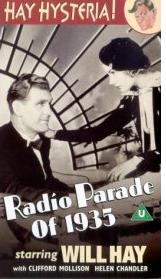| Radio Parade of 1935 | |
|---|---|
 | |
| Directed by | Arthur B. Woods |
| Written by | Paul Perez |
| Produced by | Walter C. Mycroft |
| Starring | Will Hay Helen Chandler Clifford Mollison |
| Cinematography | Cyril Bristow Phil Grindrod |
| Edited by | Edward B. Jarvis |
| Music by | Benjamin Frankel |
Production company | |
| Distributed by | Wardour Films |
Release date |
|
Running time | 96 minutes |
| Country | United Kingdom |
| Language | English |
Radio Parade of 1935 (1934), released in the US as Radio Follies, is a British comedy film directed by Arthur B. Woods and starring Will Hay, Clifford Mollison and Helen Chandler. [1] [2] It followed on from the 1933 film Radio Parade .